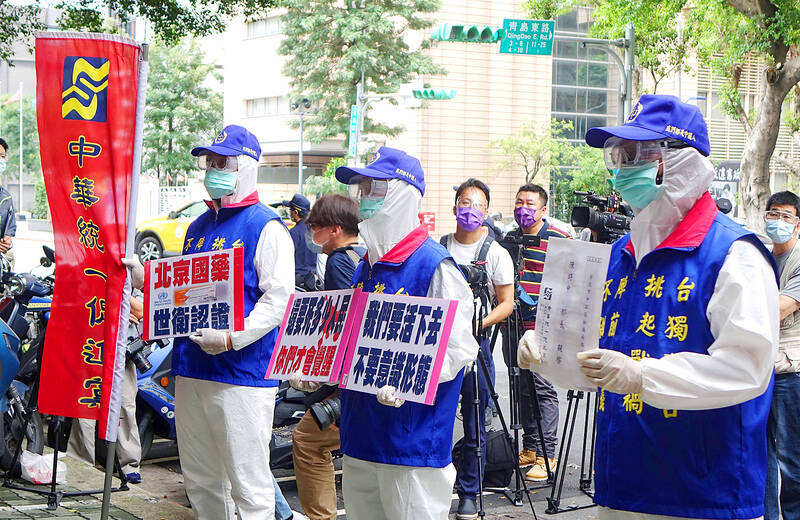The Ministry of the Interior on Thursday said it would ask the Constitutional Court to dissolve the China Unification Promotion Party (CUPP).
The ministry in a statement said that its Political Party Review Committee approved a resolution to seek the dissolution of the New Taipei City-based CUPP with a required two-thirds vote after inviting the party’s leadership to make a statement in its defense.
The ministry said that the party is known to be involved in organized crime, and has core members who have “repeatedly” contravened the National Security Act (國家安全法), the Anti-Infiltration Act (反滲透法), the Act Governing Relations Between the People of the Taiwan Area and the Mainland Area (臺灣地區與大陸地區人民關係條例) and election laws, thus “endangering national security, social stability and fair elections.”

Photo: Liu Hsin-de, Taipei Times
While the ministry “respects” the political stances of the CUPP, it “cannot accept” repeated national security breaches and acts of violence by party members, the statement said.
The CUPP’s “links to foreign forces” and “use of a political party name as a cover for organized crime,” among other things, contravene the Constitution and laws, even if the party does not hold any seats in the legislature, or in any city or county councils, it said.
Under the Constitution authorities can request the dissolution of a political party whose “goals or activities endanger the existence of the Republic of China or the nation’s free and democratic constitutional order,” the ministry said.
The ministry acknowledged that its request might be complicated by an ongoing political dispute over Constitutional Court vacancies and a reform bill, which has left the court’s operations in a cloud of uncertainty.
A request to disband the CUPP would be submitted as soon as the court’s situation permits, the ministry said.

A Ministry of Foreign Affairs official yesterday said that a delegation that visited China for an APEC meeting did not receive any kind of treatment that downgraded Taiwan’s sovereignty. Department of International Organizations Director-General Jonathan Sun (孫儉元) said that he and a group of ministry officials visited Shenzhen, China, to attend the APEC Informal Senior Officials’ Meeting last month. The trip went “smoothly and safely” for all Taiwanese delegates, as the Chinese side arranged the trip in accordance with long-standing practices, Sun said at the ministry’s weekly briefing. The Taiwanese group did not encounter any political suppression, he said. Sun made the remarks when

The Taiwanese passport ranked 33rd in a global listing of passports by convenience this month, rising three places from last month’s ranking, but matching its position in January last year. The Henley Passport Index, an international ranking of passports by the number of designations its holder can travel to without a visa, showed that the Taiwan passport enables holders to travel to 139 countries and territories without a visa. Singapore’s passport was ranked the most powerful with visa-free access to 192 destinations out of 227, according to the index published on Tuesday by UK-based migration investment consultancy firm Henley and Partners. Japan’s and

BROAD AGREEMENT: The two are nearing a trade deal to reduce Taiwan’s tariff to 15% and a commitment for TSMC to build five more fabs, a ‘New York Times’ report said Taiwan and the US have reached a broad consensus on a trade deal, the Executive Yuan’s Office of Trade Negotiations said yesterday, after a report said that Washington is set to reduce Taiwan’s tariff rate to 15 percent. The New York Times on Monday reported that the two nations are nearing a trade deal to reduce Taiwan’s tariff rate to 15 percent and commit Taiwan Semiconductor Manufacturing Co (TSMC, 台積電) to building at least five more facilities in the US. “The agreement, which has been under negotiation for months, is being legally scrubbed and could be announced this month,” the paper said,

Japan and the Philippines yesterday signed a defense pact that would allow the tax-free provision of ammunition, fuel, food and other necessities when their forces stage joint training to boost deterrence against China’s growing aggression in the region and to bolster their preparation for natural disasters. Japan has faced increasing political, trade and security tensions with China, which was angered by Japanese Prime Minister Sanae Takaichi’s remark that a Chinese attack on Taiwan would be a survival-threatening situation for Japan, triggering a military response. Japan and the Philippines have also had separate territorial conflicts with Beijing in the East and South China